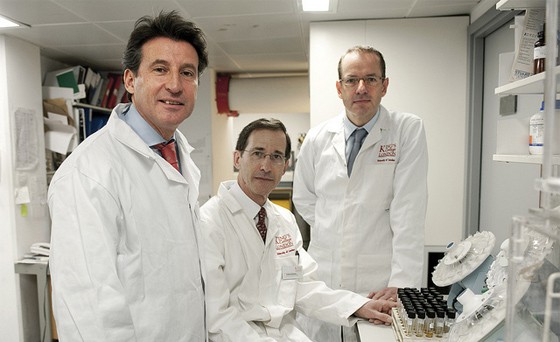
Lord Sebastian Coe, Professor David Cowan and GSK’s CEO Sir Andrew Witty at the anti-doping faciltiy in Harlow
The anti-doping facility provided by GlaxoSmithKline (GSK) for the London 2012 Olympic and Paralympic Games will be turned into a research centre to develop personalised, targeted medicines after the sporting events finish.
Funded and run by the UK’s Medical Research Council (MRC) and the Department of Health’s National Institute for Health Research (NIHR), the MRC-NIHR Phenome Centre will make use of GSK’s facilities in Harlow to analyse the metabolism of an individual or population set in an attempt to discover its link to how someone responds both to a disease and to treatment.
This research could potentially lead to the discovery of new biomarkers to explain why one individual or population may be more susceptible to a disease than another, and help discover more precise methods of treatment, said the MRC – a publicly funded body focused on health research.
Professor Sir John Savill, chief executive of the MRC, described the facility as a “phenomenal legacy” from London 2012.
He continued: “Rather than losing this investment once the Games are over, the collaboration – involving the MRC, NIHR, UK universities, the NHS and NIHR Biomedical Research Centres, and industry leaders in the field – will provide a unique resource that will ultimately result in benefits for patients.”
Research at the centre will be led by Imperial College London, with support from King’s College London. Scientists will be funded by a jointly awarded grant from the MRC and NIHR.
Other organisations involved in the facility include Bruker BioSpin and Waters Corporation, who will supply nuclear magnetic resonance and mass spectrometry equipment respectively.
GSK is currently providing a 24-hour doping service at the laboratory in partnership with the London Organising Committee for the Olympic and Paralympic Games (LOCOG) and King’s College London, using a workforce of 1,000 people to test 400 samples a day.
It is the first private company to have responsibility for drug testing during the Olympic Games, with the service previously provided by the International Olympic Committee with the World Anti-Doping Agency and the national authority of the hosting country.
Patrick Vallance, president of pharmaceuticals R&D at GSK, said the company was providing its facilities to the MRC and NIHR to ensure the UK “retains a leading position in the life sciences”.
“The MRC-NIHR Phenome Centre will deliver world-class science through collaboration between research institutes, academia and industry – an approach GSK believes is crucial to driving scientific innovation.”
GSK’s role in the London 2012 Olympic Games has also inspired the company’s first consumer-facing corporate campaign in the UK, featuring athletes such as triple jumper Phillips Idowu and sprinter Marlon Devonish.




